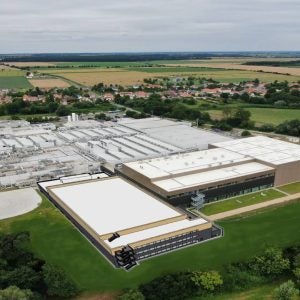Cipla Gives Seal of Approval for OEL Level 5 Screener
Cipla of India relies on the revolutionary Compact Airlock Sieve® to ensure their new highest OEL-compliant plant is not jeopardised during the screening operation.
Screening equipment is an integral part of most pharmaceutical processes; it ensures that ingredients and finished products are quality assured during production and before use or dispatch. When processing active pharmaceutical ingredients (APIs), the occupational exposure limit (OEL) has a significant part to play in the design of a process to ensure operators are not at risk to exposure. Therefore, when Cipla built their OEL-compliant plant at their Goa factory in 2005, having a screener that would ensure product quality and integrity were maintained without compromising the safety of their operators was essential.
In recent years the pharmaceutical industry has seen a growing demand for products that require APIs and with the introduction of highly potent APIs (HPAPIs), the concern for operators’ safety due to the adverse effects related to the handling of dangerous compounds is becoming more prevalent. Although a range of personal protective equipment (PPE) is widely available, this can only reduce exposure levels rather than eliminate them. Therefore, having certified plant equipment that can help reduce OEL levels must be considered an advantage not only to improve the working environment of operators but also to reduce costs associated with sophisticated PPE and dust containment systems.
Cipla’s new OEL-compliant plant was built for the manufacture of a new highly potent drug and, as with nearly all processes handling pharmaceutical powders, a number of sieving operations were required to ensure that specification and quality were upheld; firstly on incoming raw materials to remove any oversized contamination and secondly after granulation to remove undersized particulates.
It was the task of Tapas Datta, factory manager of the Cipla plant in Goa, to source a suitable screener to meet their stringent requirements. Due to the vibrating action of a sieve, dust can be generated very easily and therefore the need for a high containment sieve was required. Known as the Compact Airlock Sieve, Russell Finex’s OEL level 5 sieve utilizes a pneumatic clamping system, which, combined with its patented Twist Lock Inflate (TLI) technology, provides a uniform dust-tight seal. “We were unable to find a sieving unit anywhere else with this level of containment,” explains Tapas.
Effective guard against powder leakage
The unit is clamped together with a revolutionary airlock system. The pneumatic lock gives an even and high clamping force across all sealing faces and therefore guards against powder leakage more effectively than traditional band clamps or over-centre toggle clamps. Through independent tests this valitable clamping system has been certified to an OEL value less than 1µg/m³ (OEL level 5).
The relationship between Russell Finex and Cipla started in 2001 after Cipla purchased their first screener. To date, the Goa site has multiple Russell screeners positioned in a variety of production lines carrying out various check screening and grading applications.
“During initial product trials, we recognised how the new Airlock screener utilises the Russell Compact technology to increase screening efficiency, allowing even sticky products to be sieved without blinding,” Tapas adds. “Also, due to its new clamping system, it is extremely easy to dismantle when compared to conventional clamping methods.”
Assembly and disassembly of the sieve is achieved in seconds. The component parts are placed into the base and located by twisting and locking the lid without the need for tools. The airclamp is then inflated to secure and seal the unit during operation. The unit is suitable for either continuous or batch operations and also lends itself to applications where a number of different products are being processed, due to the simplicity and speed with which it can be disassembled and cleaned.
The plant has been in operation for over three years and Cipla has been looking at ways to improve the process further. Although the cGMP design of the screener is based on clean lines, making sanitation easier, reducing the exposure of operators to products during clean down of the sieve can be achieved by retrofitting the Russell WIP system. This spray ball system allows an even spray on the product contact parts to wet the components prior to dismantling the sieve, improving handling of the components during clean down.
Tapas concludes, “We would always prefer to purchase a Russell sieve due to their high quality design, finish and performance. It is clear that this particular unit has been designed specifically for this type of application.”
For over 75 years Russell Finex has manufactured and supplied filters, sieves and separators to improve product quality, enhance productivity, safeguard worker health, and ensure liquids and powders are contamination-free. Throughout the world, Russell Finex serves a variety of industries with applications including food, pharmaceuticals, chemicals, adhesives, plastisols, paint, coatings, metal powders and ceramics.










